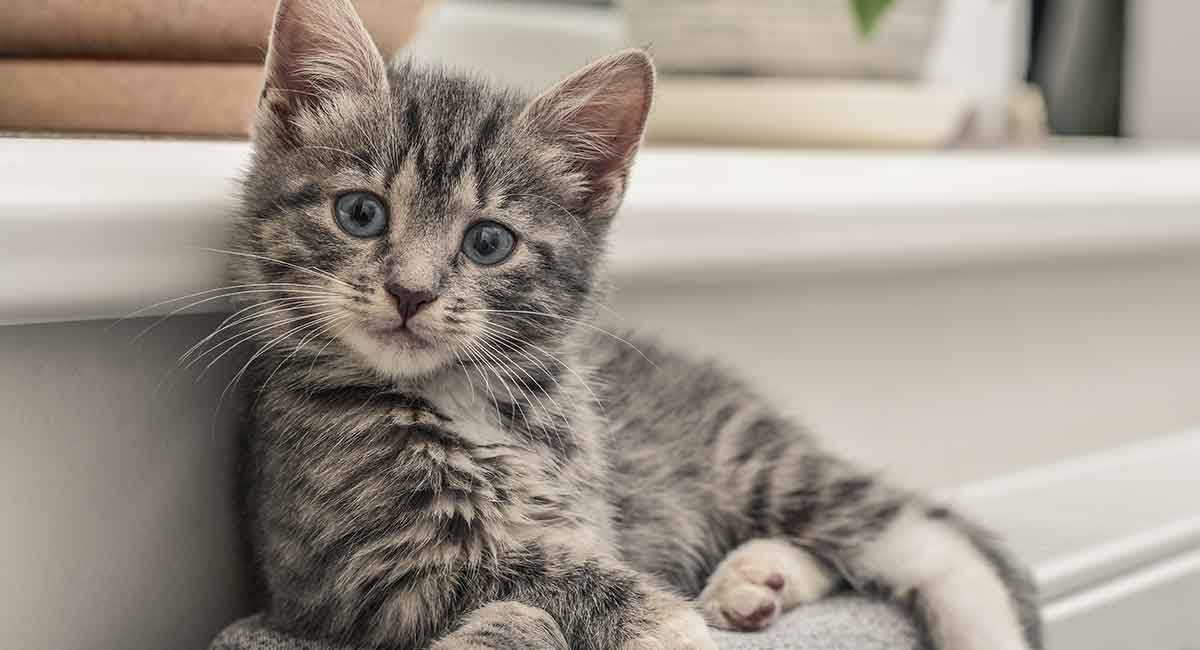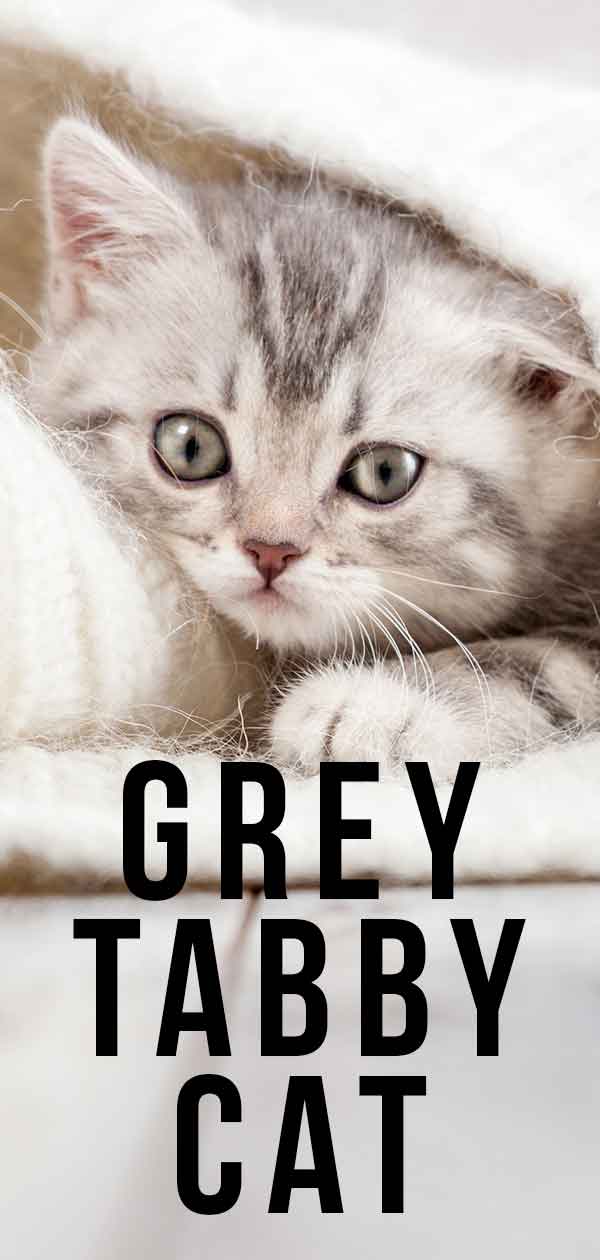
A grey tabby cat has black stripes on a grey fur background, or dark grey stripes on a pale grey coat. These prominent stripes can be mackerel, ticked, striped or blotched in pattern. And grey tabbies are found in several different popular cat breeds.
- The wonderful types of grey tabby cat
- Do grey tabbies have great temperaments?
- Health and longevity
- Is this the right pet for you?
I’ve always loved grey tabbies ever since my parents read me the Mog The Cat books by Judith Kerr as a child. The idea of one day having my own Mog was very appealing, and the reality hasn’t disappointed.
Types of Grey Tabby Cat
Are you surprised to hear that a grey tabby isn’t just one type of cat? It’s true! There isn’t a ‘grey tabby cat’ breed. Instead, lots of purebred, crossbred and cats of unknown mixed ancestry can have stripey silver coats. What’s more, grey tabby cats can be organized by their exact color and stripe type, as well as (or instead of) their pedigree.
Breeds That Can Be Grey Tabbies
Lots of well known and not-so-well-known cat breeds can have grey tabby coats. For example:
- American Bobtails
- American Wirehairs
- British Shorthairs
- Bengals
- Maine Coons
- Manx
- Norwegian Forest Cats
- Persians
So can many crossbreed cats, and cats of unknown mixed ancestry (a.k.a. domestic short hairs and domestic long hairs). In fact, it’s estimated that over 9 in 10 pet cats are crossbred, so most gray tabbies will fall into this category too.
Stripes and Patterns
Grey tabby cats can have:
- Black stripes on a dark grey background.
- Black stripes on a light grey background (also known as silver tabby).
- Dark grey stripes on a light grey background (also known as blue silver tabby).
They can even have white patches too, or be one of the color point breeds, such as a Siamese cat. Grey tabby color point cats only have a visible tabby pattern on their face, legs and tail.
Finally, it’s possible to group grey tabby cats by the types of stripe they have. The four possibilities are:
Mackerel stripes are the most common, whilst ticked and spotted stripes are usually only seen in specific breeds. They are all recognizable as tabby patterns though, because they all include a characteristic dark ‘M’ on the cat’s forehead.

Why Are There So Many Grey Tabbies?
So, these pretty kitties come in all kinds of shapes and sizes, and there’s lots of potential for variation in their exact color, and the pattern of their stripes. But how did the grey tabby pattern come to be so diverse and widespread? Part of the reason is that the brown-and-grey mackerel tabby was the ‘original’ cat coat. In other words, it is the coat of all domestic cats’ most recent wild ancestor – the African wild cat. So, tabby stripes and grey pigmentation became predictably widespread among pet cats too.
Since then, random genetic mutations have resulted in variations of the layout of their stripes, and also eliminated the production of red pigment, so that once-brown fur becomes grey instead. And these mutations have spread, in part, because we love them and find them beautiful. So we’ve gone out of our way to reproduce them in new generations of kittens.
Grey Tabby Cat Temperament
All tabby cats have a personality which is as unique as their stripes. While there are some cats who adore contact and cuddling, and even learn tricks, others prefer independence, exploration, and observing their human families from high perches. Intriguingly, researchers have looked for links between feline coat color and temperament. One study reported that grey and white cats are amongst those most likely to be aggressive towards humans during handling, everyday interactions, and vet visits. But another survey didn’t associate gray fur or even tabby stripes with a significant increase in any type of behavior.
So the matter of whether grey tabby cats have any specific personality traits is still unresolved. And some scientists are convinced that predictable differences in feline behavior can be more accurately attributed to their breed, than their color.
Health and Lifespan
Grey tabbies come from all walks of life, and their health and life expectancy reflect that. To the best of my knowledge, there’s no evidence that their coat puts them at a higher risk of any specific ailments. Since lots of types of cat can be grey tabbies, some interesting patterns in feline health more generally are:
- The most common health problems of cats presented at veterinary clinics are tooth and gum disease, flea infestation, obesity, traumatic injuries, and skin disorders.
- Non-pedigree cats are more likely to be diagnosed with abscesses and hyperthyroidism than pedigree cats.
- Whereas pedigree cats are more likely to be diagnosed with coat disorders than domestic shorthairs and longhairs.
- But overall, neither group has a higher rate of illness generally.
- In terms of life expectancy, crossbred cats have the edge. Pets with mixed ancestry live 14 years on average, vs 12.5 years for pedigree cats.
We also know that important determinants of any cat’s health are:
- Eating a high quality, age-appropriate diet.
- Maintaining a health weight.
- Physical exercise.
- Mental stimulation.
- Opportunities to practice natural behaviors, like scratching.
- Regular preventative healthcare, such as flea and worming treatments.
Is A Grey Tabby Cat Right For You?
Since this coat is possible in so many types of cat, I think there is probably a grey tabby who’s right for any cat-loving household!
Whilst they have a reputation for being aloof and independent, it’s smart to be mindful of the fact that some cat breeds are quite the opposite. Persians are generally very affectionate for example. And Bengal and Siamese cats are frequently described as almost dog-like in their love of human interaction and playing games. So, consider how self-sufficient you want or need your cat to be, before committing to a specific breed.
I also think that the specific health problems of some pedigree cats deserves some special consideration. For example Manx cats are known to experience a higher frequency of spinal disorders stemming from their lack of tail. And flat faced cats, such as Persians, have a higher incidence of breathing difficulty, eye injuries, and dental problems.
I found 4 grey tabbies in a box inside a dumpster. I couldn’t believe what I was seeing. I brought them home with me well that was approximately 6 months ago. I have no regrets with my decision to keep them. 3 of them are so loving but one is not at all. All 4 are boys.
Kool, i have 1 grey kitten 3 months i brought in from a blizzard, awesome cat and loves my other 5.
I really like the American Short-Hair breed of cat. I have two rescues – Louie & Oscar. They are my buddies.
Hi I had a grey tabby named Pebbles my husband gave him to me as a birthday present for my birthday . I had Pebbles for 10 years and I took him in to the vets for a check up and I found out he had a tumour in his belly it just broke my heart he was my best friend . When it was time to say goodbye it broke my heart and it took me so long to get over it but it was the best thing I did for him Oxoxox love Jackie
I have a blue grey I don’t know if he is a tabby also a calico love both
Had a spiral pattern Grey tabby for 15years. From a litter of a stray.. Such a sweetie. Very missed.
I just adopted a gray/white tabby, Zoey, and she’s the sweetest! My beloved Bella passed and Zoey is helping my broken heart.
I have a Grey tabby I got for my Bday. Her name is Nazia Purr. She is so affectionate. Loves to snuggle..jump on my bed n on my stomach n purrs. I love her. Even with her destroying my leather furniture.
My grey and white tabby is the opposite of aggressive (other than being an aggressive cuddler). If you don’t want to pet him or cuddle when he demands it, beware.
We have a perfect grey tabby named baby…She plays fetch with her little ball taps my nose lightly in the morning to let me know it’s time to feed her… Is cuddly one minute off on her own adventures around the house the next… If one of us leaves for work she cuddles the one that’s home… She seems to catch onto things very quickly… She will be 1 February 7th we love this lil girl so much…
I have a Gray Tabby who was my neighbor he was and is still my best friend, named Romeo. He is named appropriately, he’s a sweet boy, a little lover. When my husband passed, he spent nights with me. I woke up with him right beside me and his paw on my shoulder. When I had to move, my neighbor gave him to me. He lives with my mom and I and we love him. He’s soft and has a white chest and white paws.
I have two tabbies, one is a patch tabby that is female and she is a sweet heart and the other is a boy that is grey with black stripes and he’s a big cat. I find tabbies very loveable and easy temperament.